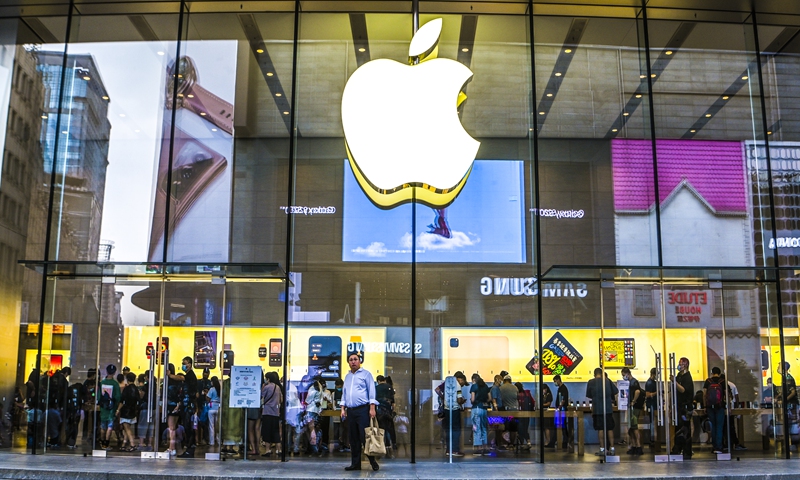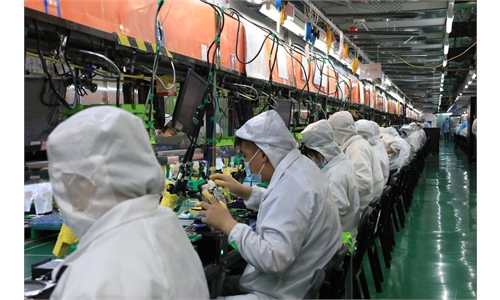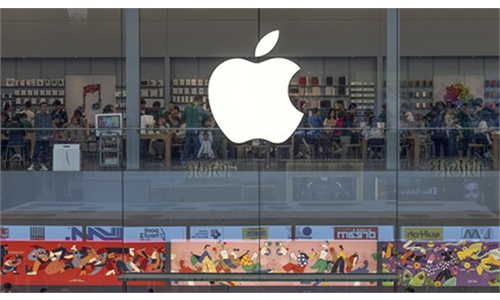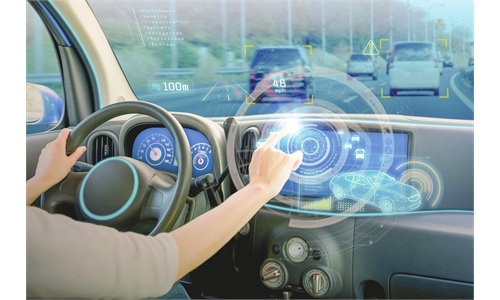Latest iPhones get lukewarm response in China, while Apple suppliers switch to EV sector amid sluggish consumer spending
Apple suppliers switch to EV sector amid sluggish consumer spending

A flagship store of Apple in Shanghai Photo: VCG
Apple's iPhone 14 series has met with a lukewarm response in China, given its apparent lack of innovations, and some Chinese suppliers are reducing their dependence on the US tech giant by switching to electric vehicle (EV) producers, aiming to survive in a sluggish electronics market.
On Thursday (Beijing time), Apple held a new product launch event, during which it released its new devices of the iPhone 14 series, including the iPhone 14, 14 Plus, 14 Pro and 14 Pro Max. With prices ranging from 5,999 yuan ($861) to 13,499 yuan, pre-orders will be accepted from Friday and formal sales will start on September 16.
The hashtag "Apple releases the most expensive iPhone in its history" trended on China's social media Sina Weibo on Thursday, yielding 230 million views and 12,000 discussions as of 7 pm. However, many netizens said that there were few innovations in the iPhone 14 series and they wouldn't buy the new devices.
At an Apple shop in Beijing on Thursday, there were few customers, with a handful asking about the performance and price of the iPhone 14. One shopper surnamed Wang told the Global Times that after comparing the iPhone 13 and iPhone 14, she would rather buy an iPhone 13, whose price has just been cut.
"It's tough for Apple to come up with the same kind of remarkable innovations made under the leadership of Steve Jobs, but we can see that Apple is still striving to make its smartphones different from other brands," said another customer surnamed Liu. However, he said that he won't buy an iPhone 14, as his device still works well.
Ma Jihua, a veteran industry analyst, told the Global Times on Thursday that the decrease in consumers' attention to new iPhones reflects their declining expectations for innovation. Consumers are also holding back on spending for new phones due to narrowing gaps among brands and economic downward pressure.
Following Apple's launch event, related shares rose on Thursday, underscoring optimism for a turning point in the consumer electronics sector during the third quarter.
Suzhou Cheersson Precision Metal Forming Co, which manufactures mobile communication metal parts, saw its shares surge by the daily limit of 10 percent to 27.16 yuan, while Ningbo Boway Alloy Material Co was up by 2.33 percent and Jiangsu Transimage Tech gained 1.12 percent.
"With competition from Huawei's new mobile phones, the sales of the iPhone 14 series may reach around 17 million units over the coming six months, down from 20 million for its iPhone 13 series," Sun Yanbiao, head of Shenzhen-based research firm N1mobile, told the Global Times on Thursday.
Amid the declining competitiveness of Apple products and the gradual saturation of the global mobile phone market, many suppliers for Apple have diversified into supplying components for EVs.
Smartphone shipments in the Chinese mainland fell by 10 percent year-on-year in the second quarter, with a total of 67.4 million units shipped, according to market research firm Canalys.
"Returning to first place, vivo shipped 13.2 million units, followed closely by HONOR with 13 million units. OPPO (including OnePlus) stayed in the top three, shipping 11.8 million units.
"Xiaomi was fourth with 10.6 million units, while Apple was fifth with 9.9 million," Canalys data showed.
Beijing-based Bybon provides mobile phone maintenance and repair and has been Apple's after-sales service provider for over 13 years. In the first half of the year, it lost 17.1 million yuan, a sharp reversal from its year-earlier profit of 5.59 million yuan, according to the company's interim report.
"Bybon strategically reduced its new device sales business, and its maintenance revenue decreased due to disrupted supply chains amid the impact of COVID-19 between March and May," it said.
Amid slow growth in the consumer electronics sector, Apple's Chinese suppliers have sought to survive by shifting to the new-energy vehicle sector.
Suzhou Anjie Technology Co is a supplier of precision functional components for Apple. The company reported first-half net profit of 137 million yuan, up 381.16 percent year-on-year, buoyed by fast growth in the vehicle business.
With years of experience in software and hardware, Suzhou Anjie has expanded into the research and development and production of new products like high-power wireless charging systems for EVs, the company said in its interim report, noting that the proportion of its EV business has risen to 27.96 percent.
"The trend will continue over the next few years," Ma said, noting that domestic suppliers are very willing to expand sales to downstream companies to increase their survival capability as orders from Apple dry up.



